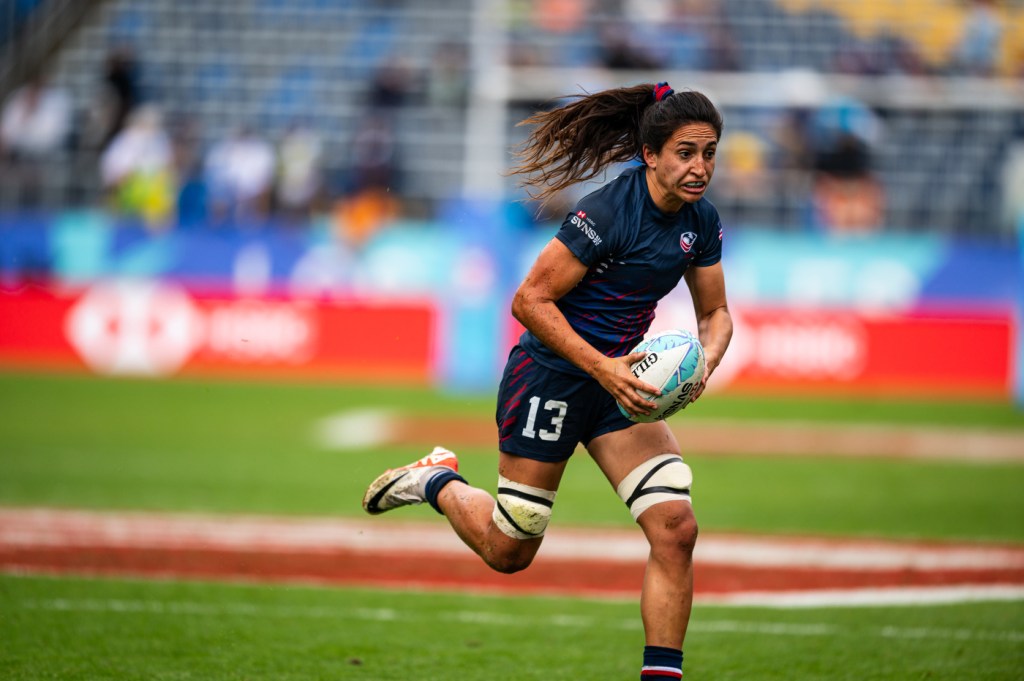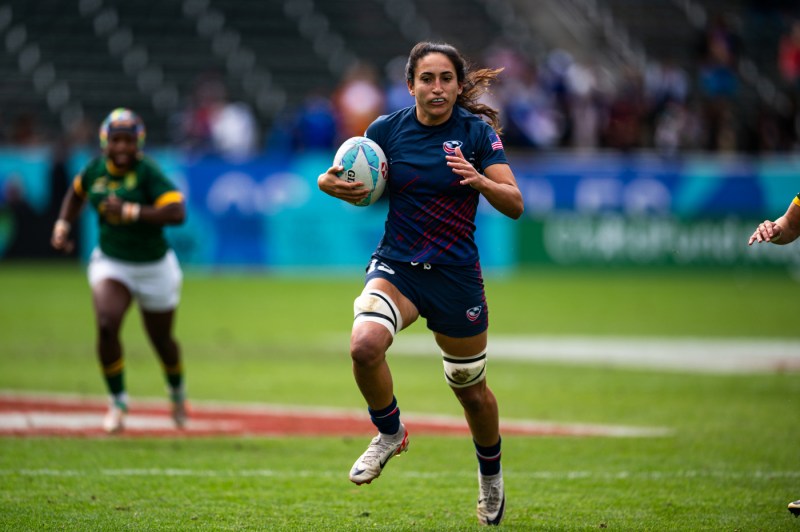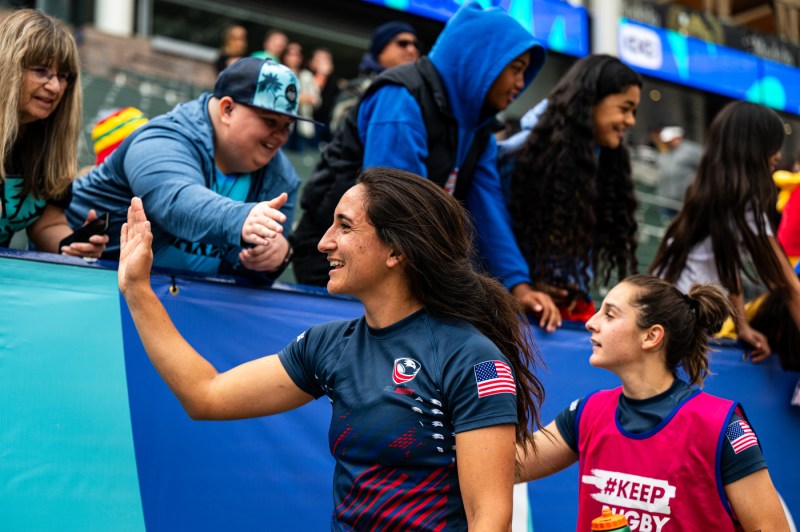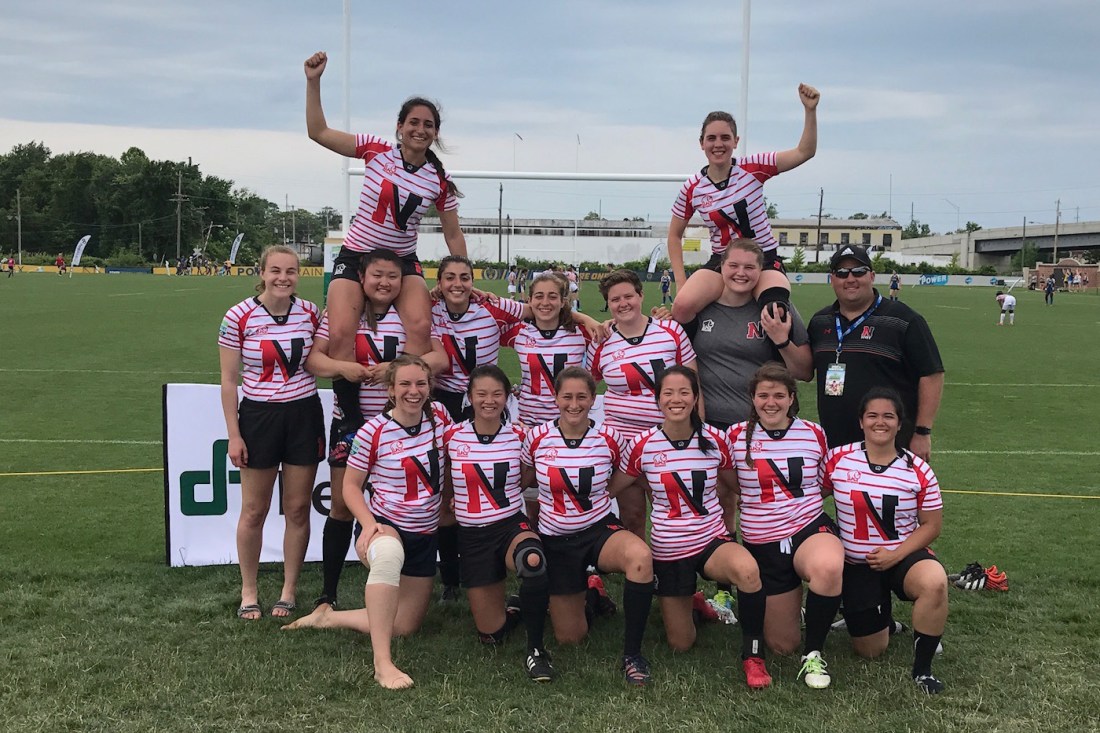Published on
Sarah Levy seeks an Olympic gold medal 10 years after she fell in love with rugby at Northeastern
“A year ago I didn’t think I would be here,” says Levy, among 13 Americans competing in the women’s rugby sevens tournament at the Paris Olympics July 28-30.

Sarah Levy hadn’t played any rugby before she came to Northeastern University a decade ago. Now she’s among 13 Americans heading to Paris to compete in the women’s rugby sevens event at the Olympic Games.
“We’re going for gold,” Levy says. “And if not that, then a podium finish is what we want — we truly believe in our team to do that.”
The women’s rugby sevens Olympic tournament opens with group play in the 69,000-seat Stade de France on July 28, two days after Levy and her teammates participate in the opening ceremony among a parade of boats along the Seine. Levy’s U.S. team is No. 4 in the women’s rugby sevens world rankings.
The dream of competing in the Olympics has driven Levy for almost as long as she has been playing rugby. Having arrived at Northeastern’s Boston campus in 2014 as a freshman from San Diego, she signed up for the women’s rugby club at Fall Fest along with several other club sports — soccer, triathlon and climbing.
“Rugby was the first one with tryouts, and there was a girl on my floor that was also going, so I succumbed to peer pressure pretty easily,” Levy says. “She was like, ‘You’re going on Tuesday, right?’ She got me to go.”
By week’s end Levy was being invited to compete for Northeastern in a game — even though she didn’t know many of the rules.
“Whoever showed up could play, and I think I scored twice in my first game,” Levy says. “It was really fun, it was a lot of adrenaline and it was an easy way to make friends.”


Levy was raised in Southern California but was born in rugby-mad South Africa, where a family member, Louis Babrow, was a lifelong opponent of apartheid and a player in the 1930s for the national team, the Springboks. Levy’s father also played rugby, and her new interest in the sport provided them with a conversation point.
“And then I learned the rules as I played,” she says. “I was a tiny person back then and I was really scared of getting tackled. So that’s enough to get you to run as fast as you can.”
One stride led to the next. There was a time along the way when she considered quitting rugby as she balanced her love for the sport with the pursuit of an eventual career in physical therapy.
It was only recently that making the Olympic team became a realistic goal.
“A year ago, I didn’t think I would be here,” Levy says. “Thinking that I was at the bottom of the [USA Rugby] training group and then turning that around with a lot of hard work, I think I would be the most surprising person on this roster right now.”
Editor’s Picks
‘Get the ball to Sarah’
Levy competed in soccer, track, cross country and golf in high school.
“I was athletic but I don’t think I was particularly a standout in any of the sports,” says Levy, who is 5 feet, 8 inches tall. “I found in rugby your athleticism was celebrated instead of pushed under the rug.”
She began playing rugby union, the traditional form of the sport with 15 players per side. Levy found herself being drawn to the weight room, where she trained religiously.
“I spent a lot of time at the school gym, putting in those hours and then seeing it translate on the field,” Levy says. “I think that piqued my interest in physical therapy as well, seeing my [newfound] strength and how I could break tackles or make tackles, and that opened up a new aspect of the game that I learned to really like.”
Levy’s commitment to rugby helped draw her to physical therapy. “I was like, this is exactly what I want — PT is a mix of health care and exercise and movement,” says Levy, who graduated in health sciences in 2018.
Keith Cattanach, who has been coaching the Northeastern women’s rugby club since 2012, remembers Levy as a quiet and humble star. Even as she grew stronger and faster, her teammates had to talk her into believing she could turn the corner past opposing defenders and break into the open field.
“Once she grabbed her confidence — bam — she was on a roll and it all clicked,” says Cattanach, who altered the game plan to exploit Levy’s speed in her junior year. “We catered to that ability that she had to get into space. Basically it was get the ball to Sarah — and she’s gone.”
The club transformed into a regional powerhouse during Levy’s four years at Northeastern, providing a foundation that would enable the Huskies to earn their first College Rugby Association of America women’s Division 1 championship last year. Cattanach’s program focuses on rugby union in the fall and rugby sevens in the spring — another trend that Levy helped create.
You put your body on the line for each other, so you become really close. My teammates at Northeastern, they’re some of my closest friends.
Sarah Levy, Northeastern grad and future Olympic rugby player
As a Northeastern freshman she competed in one rugby sevens tournament, which was enough to win her over. “It was so hard, so tiring, but I loved it,” says Levy, who returned home to San Diego to play with a local sevens team.
“Back at Northeastern I was like, ‘OK, I’m going to find a way to play as many tournaments as we can,’” Levy recalls. “And then that’s when they created a sevens program.”
With only seven players per team spread across the large field, the rugby sevens game is faster and typically played in open space. The intensive seven-minute halves force teams to compete at an exhausting pace.
Her teammates convinced Levy to captain the sevens program as a sophomore (“Why would anyone want me to be the captain? This is crazy”) and by the time she left Northeastern, she was focused on an ultimate goal. Her aim was to represent the U.S. in the Olympics, regardless of the odds against her.
An ironic opportunity
Levy worked for a year at a physical therapy clinic in Connecticut while playing for the New York Rugby Club as well as the Northeast Academy, a program sanctioned by USA Rugby. By the end of 2018 she had been invited to play for USA Rugby’s fifteens team.
But sevens was where she wanted to be, and one year later she was putting herself on a six-month time limit: If she hadn’t heard from USA Rugby’s sevens program by the end of 2019, she would focus on grad school and her PT career.
That December, in the final days of her self-imposed deadline, she was invited to the U.S. sevens camp. She has been training with the program ever since while also earning a physical therapy doctorate.
Levy’s break came when she wasn’t selected to play in the postponed 2021 Tokyo Olympics, ironically. At that time the COVID-19 pandemic was hindering plans to develop the next generation of players, so a make-do scheme was improvised: Levy was among a half-dozen prospects who were invited to intensive sessions while the Olympic team was training for Tokyo.
“This is where I got so much better,” Levy says.
Having finished the brunt of her doctorate, Levy was able to devote the past year to rugby. “That allowed me to have more brain space and use my extra time for nutrition, recovery, getting more sleep, studying more film and just fully taking this year seriously,” she says.
As her role on the team expanded, it became increasingly likely that she would be selected for Paris.

“I was stressed about it for so long that it didn’t really alleviate the stress,” she says of the official announcement last month. “It was like, OK, I made it, next task …
“As I started calling friends and family, it became more and more real, seeing how proud they were,” she says. Only then did she realize “this is the biggest moment of my life.”
As a wing, Levy is asked to make plays in the open field while also using her length, jumping ability and explosiveness defensively to create steals. She tends to come off the bench as a finisher who provides speed at the end of games.
Utilizing the full roster will be crucial in Paris, where the gold medalist will be faced with playing six games over three days. At least two of Levy’s former Northeastern teammates will be in Paris to cheer her on.
“The community at Northeastern on that team inspired me to work hard in rugby,” Levy says. “You put your body on the line for each other, so you become really close. My teammates at Northeastern, they’re some of my closest friends.”
At 28, Levy hopes this is the beginning of her Olympic career, knowing that Los Angeles will host the Summer Games in 2028.
“Sevens is such a short game that whoever shows up for those 14 minutes and maintains focus can get there,” Levy says. “I think we can beat any of the teams [in Paris]. It’s just about making sure that we control everything that we can.”





